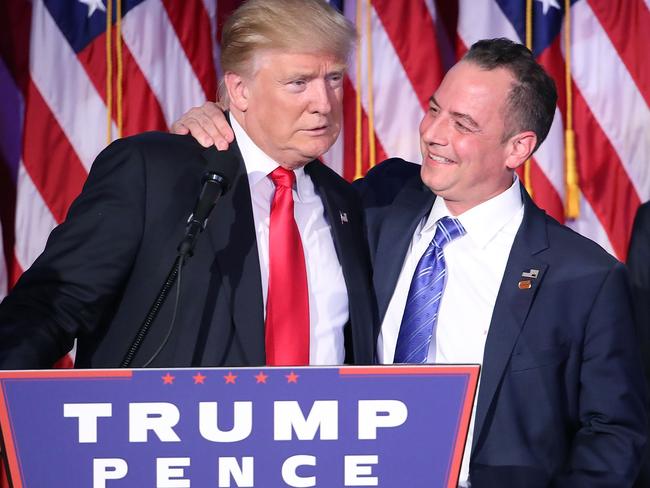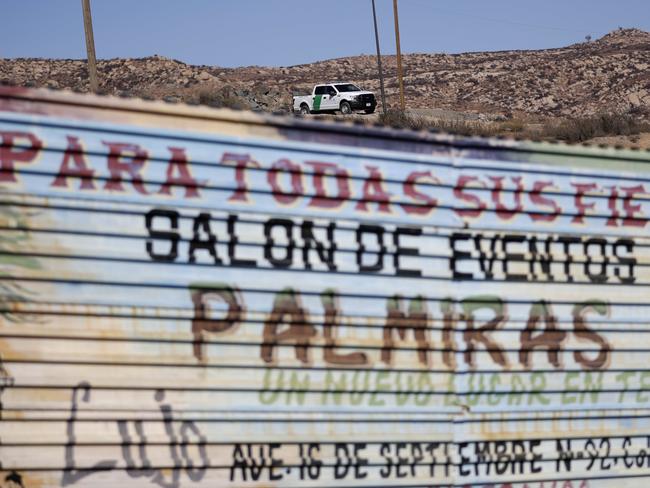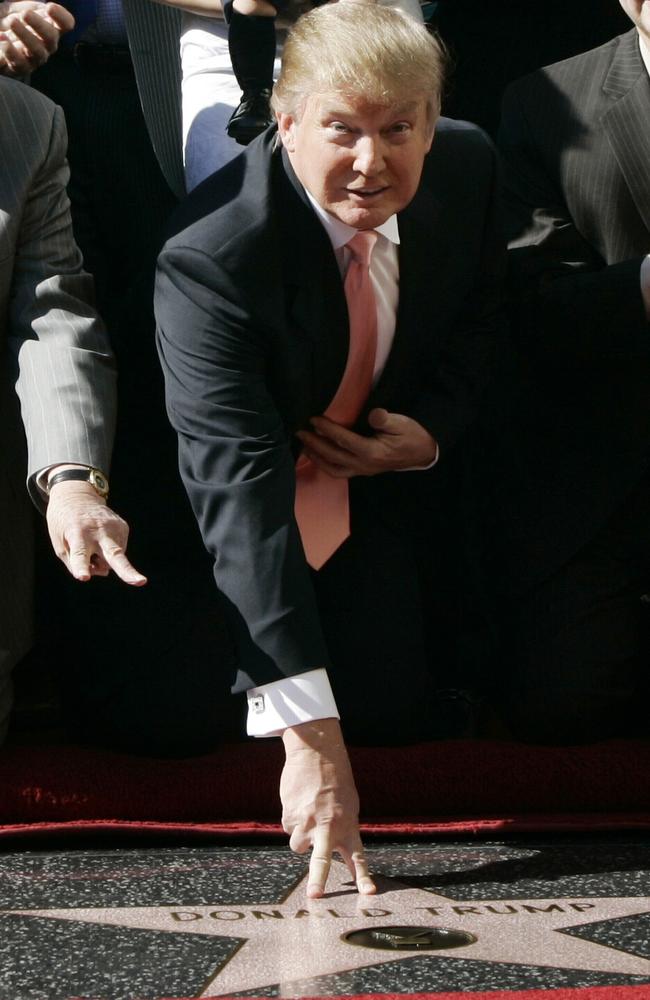Donald Trump the candidate vs. Donald Trump the president
DONALD Trump made some of the most out-there campaign promises in history. But the reality could look a little different.
HE’S been the archetypal reality TV villain, a no-holds-barred entertainer who many have loved to hate.
Donald Trump has gone from polarising ratings-grabber to the United States’ President-elect, and in the cold, grey light of day, the world is wondering what his reality actually looks like.
The billionaire business mogul and Apprentice star has evinced few qualms about contradicting himself or changing his stance, and played fast and loose with the truth throughout the campaign.
His extreme campaign promises have many terrified he could “blow up Washington”, as the Financial Times put it, with French President Francois Hollande claiming the “future of the planet” was at stake.
He’s vowed to target and kill the relatives of terrorists, punish women for having abortions and prosecute Hillary Clinton for her use of a private email server. The big question is how many of his wildest pledges he’ll really carry out.

MOST POWERFUL MAN ON EARTH?
The Republican party finished the night with a majority of at least 52 seats in the Senate and maintained control of the House of Representatives, which had many despairing that Mr Trump would be “unstoppable in office”, with “no checks and balances” to stop him doing whatever he wants.
His first task will be to hire a government front line. Foreign Minister Julie Bishop estimates there are 4000 senior jobs that are political appointments at the whim of the President and he is a leader who owes no one a sinecure except his own high-profile supporters. Many can be readily identified: Rudy Giuliani, Newt Gingrich among others.
This could cause jitters in the Republican-controlled Senate and House of Representatives, where some senior figures would see themselves well qualified for a Trump post.
The usual calculation is that a President from the party dominating Congress is the most powerful man on Earth. However, this election has shattered usual calculations.
Republican speaker Paul Ryan endorsed Mr Trump but made sure he was arm’s length from many of his campaign statements. It is unlikely they will have a warm working relationship.
The Congress itself has been hollowed out. Many members from the centre have been eliminated by elections that accentuated the left/right divide.
Some Democrats will be scary to mainstream Americans. Some Republicans will frighten members of their own party and make Trump look like a model of tempered passivity.
While Mr Trump will be a Republican President, he was not a product of the Republican party, which largely disowned him. He can ignore most of it but it can’t ignore him.
The one-time Democrat and Independent candidate may struggle to get some of his more maverick policies over the line.

THE TRUMP WALL
Mr Trump’s most headline-grabbing promise was to build an “artistically beautiful”, 15-metre-high wall along the 3057km US-Mexican border to stop immigrants crossing into North America.
The President-elect has said he will force Mexico to pay for the $10 billion structure by blocking money transfers from the US, although the country has insisted it will not shell out.
“I don’t know any policy people that take this seriously,” Alex Nowrasteh of the libertarian Cato Institute told Bloomberg.
Mr Trump’s victory is in good part thanks to his vision for “the greatest wall you’ve ever seen” along with his vows to reduce immigration by deporting undocumented migrants and suspending intake of certain groups. Voters who chanted “Build the wall!” could turn on him if he doesn’t carry out his vision.
But America’s future leader has already toned down his early vow to ban all Muslim immigration and deport 11 million unauthorised immigrants to more ambiguous statements about “extreme vetting” and unspecified for undocumented immigrants.
The American Action Forum said such a plan would reduce real GDP by $US1.6 trillion. Pew Research Center said the loss of a labour force of 11 million could spell trouble for occupations such as farming, where unauthorised immigrants make up 26 per cent of the workforce, and construction, where they account for 15 per cent.
Republican National Committee Chairman Reince Priebus, inside favourite to be Trump’s chief of staff, yesterday insisted the President-elect doens’t want mass deportation and only plans to deport criminals.
“Once it was determined he was going to be the winner, he started looking at and thinking about that speech,” said Mr Priebus. “He said, ‘We’re going to calm the waters. We’re going to bring people together. We’re not going to brag.”
Last month, his running mate Mike Pence, who called the original proposal “offensive and unconstitutional,” said Trump no longer supports an outright ban on Muslims entering the US — but exit polls showed most GOP primary voters actually supported such a move.

ENDING OBAMACARE
Mr Trump has promised to fully repeal President Barack Obama’s landmark health care law, including the mandate for everyone to have coverage, something Republicans have already shown they can get through Congress.
But they aren’t united around a plan to ensuring the 20 million people who achieved health care coverage under the law don’t lose it.
The President-elect has suggested allowing health insurance to be sold across state lines and permitting people to make tax-free contributions to Health Savings Accounts (HSAs).
Unlike most Republicans, he’s also called for the allowing of drugs to be imported from overseas to increase competition and drive down prices.
When campaigning for Hillary Clinton, Mr Obama expressed his fears Mr Trump would “undo all the good work we’ve done”. This morning, he called his successor and plans to hold a meeting to see if he can protect his legacy in some part.
TEARING UP FREE TRADE AGREEMENTS
Traditional Republicans usually support free trade, but Mr Trump’s position is very different.
He wants to restrict free trade and is strongly protectionist, saying restrictions would keep jobs in the US.
The future president has promised to extricate the US from the Trans Pacific Partnership (TPP) deal, and said he would impose a huge 45 per cent penalty on Chinese imports. He later denied the latter remark.
He also claimed Mexico was cheating the US on trade, and vowed to impose tariffs on goods such as cars made in the country.
Such a move would violate international trade rules, and Mexico and China could have it overturned by the World Trade Organization. Other countries could also inflict serious damage by retaliating against US goods.
‘MAKE AMERICA SAFE AGAIN’
Mr Trump has sworn to defeat the Islamic State by “bombing the hell” out of them and cutting off their access to oil.
He has welcomed Russian support for the Assad regime in Syria and wants to stop taking refugees from the war-torn country by creating a “safe zone” within its borders.
The President-elect told voters he will boost military spending and maintain the controversial prison at Guantánamo Bay in Cuba and add more inmates because “torture works”.
He said he was open to Japan and South Korea developing nuclear arsenals but is sceptical about NATO, saying the military coalition “costs a fortune” and the US should not automatically defend member countries.
“He has said very little of substance,” Richard Lugar, former Senator and chairman of the Foreign Relations Committee, told Bloomberg. “It appears he doesn’t have a real grasp of the range of complex issues or hasn’t done his homework.”
Israel is among the allied countries warning American faith in Assad would be foolish, and could increase the possibility of a bigger war involving Turkey and Iran.
NO ‘GUN-FREE ZONES’ AT SCHOOLS
The President-elect has made no secret of the fact he wants expanded gun rights and to eliminate all “gun-free zones”, including at schools, since they are an invitation for an attack.
Having been backed by the powerful National Rifle Association, he says all states should allow concealed carry permits and vowed to unravel Mr Obama’s minor restrictions.
He said he was against any bans, insisting “the government has no business dictating what types of firearms good, honest people are allowed to own.”
Yet he has also pandered to the other side of the debate, previously calling for a ban on assault weapons and a longer waiting period for gun purchases.
He said he would expand mental health treatment to stop the “wrong people” getting guns and supports the current system of background checks.
SWEEPING TAX CUTS
Mr Trump has pledged to cut taxes across the board, reducing the top bracket from 40 per cent to around 33 per cent.
He has vowed to cap taxes on American business profits at 15 per cent instead of 35 per cent.
Mr Trump has said cuts will pay for themselves by eliminating some deductions and credits, but both left-of-centre Tax Policy Center and the right-of-centre Tax Foundation have warned this is nowhere near true.
The scheme would cost $US9 trillion in revenue over the first decade and disproportionately benefit the wealthiest taxpayers.
And many are questioning where the savings will come from to fund his other promises, including increased defence spending. They could come from cuts to welfare payments, housing support, food stamps and healthcare aid for the poor.
‘CUT REGULATIONS BY 90 PER CENT’
The President-elect has made eyebrow-raising statements about how much he’ll reduce red tape, swearing he will “cut down regulations between 85 and 90 per cent.”
While that may sound promising for many businesses and individuals, in reality it would involve long and boring processes to make changes.
However, rules can be interpreted and enforced in different ways, as Forbes has noted. While Mr Trump may struggle to fulfil his promise to “rescind all the job-destroying Obama executive actions including the Climate Action Plan” within his first 100 days, he may be able to dilute them.
Measures such as the Clean Power Plan are still being litigated in the courts, and Mr Trump is expected to succeed in changing the make-up of the Supreme Court to have more right-wing judges.

SO WHAT WILL HE DO?
Even if Mr Trump genuinely meant everything he promised, the President-elect will find himself shackled on many counts by laws put in place by the founding fathers to avoid having another absolute monarch.
Just look at how Mr Obama failed to realise anywhere near the full gamut of his promises in eight years, notably the closure of the illegal, human-rights violating detention centre in Guantanamo.
The current US leader previously noted that “it doesn’t come to the president’s desk unless it’s impossible — otherwise somebody else would have solved it”.
Mr Trump will have to make “incredibly consequential, complex, difficult” decisions, according to CNN senior political commentator David Axelrod.
“That’s the way up fill your days for four or eight years and you have to have to people around you to help you do that.”
The President-elect will be surrounded by layers of bureaucracy and regulation. But his closest advisers may be as headstrong as him, and he isn’t known for his ability to compromise or moderate his views and his language.
“When presidents speak they can send armies marching or markets tumbling,” added Axelrod.
Ron Brownstein, political analyst and senior editor at The Atlantic, said Mr Trump is half “generic Republican”, half impossible to predict.
“He will cut taxes, he will cut regulation, he will repeal ObamaCare, he will appoint a Supreme Court Justice,” he said.
“The question is when it comes to the aspect of the agenda that made him unique and may have allowed him to get to these extraordinary numbers in white working-class America — things like building a wall, accelerating deportation — will they go along with that? Will they accept the portions of Trump that deviate from traditional Republican thinking? Will they be on board for that and if they aren’t on board for that, what does that mean for the voters that ultimately empowered him to the White House?”



